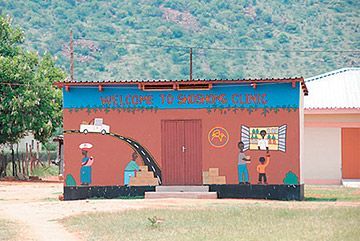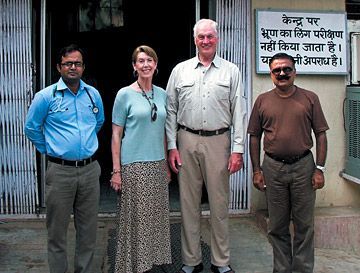It’s a new year and many chiropractors are evaluating what will enhance their respective practices, particularly as it relates to their bottom line. One of the most common questions I get is: “Do I need to be credentialed to bill insurance, and what are the best plans to join?” It’s a loaded question – but one every DC ponders. Whether you're already in-network or pondering whether to join, here's what you need to know.
Bringing Primary Care Chiropractic to the World
In the near future, doctors of chiropractic in developing countries will wear the hat of primary care provider for millions of people suffering from musculoskeletal conditions and spinal disorders. This is the goal of World Spine Care (WSC), a multinational, not-for-profit organization led by Scott Haldeman, DC, MD, PhD, a leading figure in the assessment and treatment of spinal disorders and Dynamic Chiropractic's 1991 "Man of the Year."
Since 2008, Dr. Haldeman has been on a mission to fill the profound gap in the treatment of spinal disorders in the developing world by providing evidence-based, culturally integrated prevention and assessment through a universal model of care that has the potential to dramatically change health care for millions of people around the world.
"In developing countries, [spinal disorders] can be a death sentence," said Dr. Haldeman. "We are dealing with a huge, huge problem with very little care available to people in many parts of the world."
Dr. Haldeman estimates that approximately 70 percent of the populations in developing countries today suffer from back pain and are often given limited treatment options, such as simple naproxen prescriptions for pain, without much follow-up. There are also limited specialists and clinics in many of these regions with proper training to deal with spinal issues.
"The treatment you get is more dependent upon the doctor you see than any rational, evidence-based, generally accepted treatment approach," he said. "No one has really worked out a model [that] offers the best treatment approach to anybody who has pain ... where they would come in an get a proper assessment and their treatments [would be provided] according to scientific evidence."
Vowing to be the long-term solution, Dr. Haldeman said creating a new model of care that is low-cost and low-tech, with DCs being the first point of contact as frontline health care providers, would provide many life-saving interventions.
"Everything focuses on this primary care provider, which is the most important factor because if the surgeon comes in and does his thing for two weeks, then the patient goes back to the spine care specialist that will help to take care of them," he said.
The Model WSC Clinic: Shoshong, Botswana

The journey to achieve this goal has already begun in a remote rural African village in Shoshong, Botswana, a small country located in Southern Africa with just over 2 million people. Soon after launching World Spine Care in 2008, Dr. Haldeman was able to get several sponsors and grants from Palmer College and others to get his ideas for an efficient model of care started in the small rural village.
The grants were enough to jump-start a model clinic that will provide answers on the burden of disease and the effectiveness of a new model of care by allowing Dr. Haldeman and his team to gather information for research.
Dr. Haldeman said he was drawn to Botswana because it is a community in need that has been plagued by poverty and rampant disease, including spinal disorders and HIV/AIDS. Years ago, when he and his wife took a trip to Botswana, they also discovered that 25 to 40 percent of the local hospital's incoming patients were coming in due to back and neck problems.
The resources that were available to local residents were far from adequate. In the entire country of Botswana, they found there was only one MRI scanner, two chiropractors, one orthopedic surgeon and a few physical therapists seeing only about 10-20 percent of the population - mainly those with money or private insurance.
"In developing countries, if you are making a living digging the field or bent over all the time or carrying wood on your head and you develop a complaint in your back or neck, which stops you from doing this, you can't make a living and you are likely to die," said Dr. Haldeman, who also noted that after a person in a developing country suffers from a spinal cord injury, they have a life expectancy of approximately 1.5 years if they don't receive appropriate care.
The clinical model to be tested in Botswana will involve an inter-professional, multidisciplinary approach to spinal disorders that incorporates the best available scientific evidence into the cultural, political, medical, and economic values, according to Dr. Haldeman. WSC will integrate its approach into existing local health care systems and take steps to ensure that the care provided to people with spinal disorders continues on a permanent basis.

The screening and assessment protocols that WSC will develop in Botswana will also be used to determine the appropriate direction of care, with the vast majority of the patient complaints managed within the WSC clinics staffed by clinicians with special training in low-technology, low-cost, evidence-based protocols that include manipulation, education and exercise directed at spinal conditions and musculoskeletal pain, Dr. Haldeman said.
For those patients who require secondary and tertiary care, they will be referred to medical specialists within the participating country, or to volunteer specialists (rheumatologists, spine surgeons, etc.) that World Spine Care will recruit for short-term visits to provide the required services.
In each community, DCs working in the model clinic will provide community education on the prevention of spinal injuries and spine hygiene. Local health care providers will also be recruited and scholarships will be provided to allow advanced training in spine care. This will enable the spine care centers to eventually be run by local practitioners.
"Ideally, we would like to have the Botswana project up and running and see it continuing and at least have two or three centers running there," Dr. Haldeman said.
Thus far, places like India, Malaysia and South America have already expressed their interest in WSC, he added.
The Long-Term Vision
Although the organization is focused on giving back to less fortunate communities, Dr. Haldeman is quick to point out it is not a missionary program in which DCs can sign up to do a few weeks of work in a rural village and return home.
| World Spine CarePilot Projects in the Works The World Spine Careorganization is currently working on two pilot projects that will launch thisyear, including a model clinic in Shoshong, Botswana. The two pilot projectswill test out the universal model of care that will give a DC the opportunityto work as frontline primary care provider in needy communities. Shoshong, Botswana The first model clinicto be established in Shoshong, Botswana is slated to open mid-2011. It willdevelop a sustainable capacity for effective spinal care in the community andthe regional health district by deploying and evaluating the WSC spinal carescreening, assessment, and treatment protocols, and the associated front-linehealth worker training program.Research in the regionwill include pre- and post-epidemiological studies, three sub-studiesevaluating the WSC model of care, and research tracking the nature andfrequency of musculoskeletal conditions in patients living with HIV/AIDS. Upto 600 patients will be treated at the clinic per year.In addition to theclinic, a diagnostic rehabilitation center will be established in theMahalapye District Hospital to provide secondary diagnostic and treatmentprotocols for those patients who are unable to be appropriately managed inthe Shoshong Clinic.Hand-over ofresponsibility for operation of the Shoshong clinic to the Botswana Ministryof Health is planned for 2015, with the continued partnership and support ofWSC. Ranthambhore, India After realizing therewas no care available for patients with spinal disorders in a highlypopulated district of India, Dr. Haldeman teamed up with Dr. Governhan SinghRathore, executive director of the Prakratik Society, which operates theSevika Hospital in this area of India. The hospital serves a population ofnearly 250,000 inhabitants covering 96 villages along the Ranthambhore NationalPark in the State of Rajasthan, India. Dr. Governhan SinghRathore agreed to assist World Spine Care in setting up a spine care clinicin the Sevika Hospital to help those in need. Like Shoshong, Botswana a WSCclinic is expected to be set up by the summer, staffed by a volunteerfull-time primary spine care clinician. |
Dr. Haldeman said a typical day would entail a practitioner working in a primary clinic doing assessments, screening for serious disease and also teaching courses to the local community through schools and police stations on how to manage spinal problems.
At this time, the organization is mainly focused on finding individuals who have the desire, time, energy and contacts to develop more fund-raising.
"We are hoping the sustaining grant can be ideal, [allowing us] to establish an administration and keep going from there," said Dr. Haldeman. "We are also hoping to get various grants from various industries who will come in and feel it is worth their while to put their logo on the World Spine Care site, and that they can be closely associated with the project."
The organization already has set up a strong leadership board and has obtained strong support from influential world figures. The board of directors includes Elon Musk, co-founder of PayPal, CEO of Tesla Motors and SpaceX, and chairman of the Musk Foundation. Active participants also include doctors of chiropractic, physiotherapists, medical physicians, surgeons and scientists from Canada and the U.S., with representation from Europe, Asia and Africa and even world leaders such as Archbishop Desmond Tutu.
By the end of the year, the organization hopes to accomplish some of its goals, including establishing the model clinic and doing the basic research about burden of disease in Botswana, fund-raising for sustainability of the project and the establishment of other clinics and centers by interested DCs.
Dr. Haldeman said he has high hopes that he will find the fund-raising he needs as well as the support to make the World Spine Care foundation an overall success that will give DCs a once-in-a-lifetime opportunity to make a mark as a primary care provider in the countries that need it the most.
"If this model really shows a very effective low-tech, low-cost, effective form of banishing spinal problems, it's a model that could be implemented anywhere in the world, not only developing countries but non-developing countries and rural communities in major centers," he said.
For more information about the World Spine Care model and how you can get involved, visit www.worldspinecare.org.


